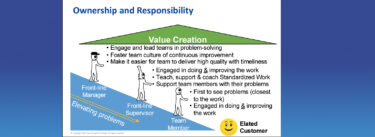I’ve now been thinking about lean continuously for thirty years, since the fall of 1979 when my MIT bosses asked me to explore how a few Japanese companies had developed a striking advantage in designing and making motor vehicles. Recently, I’ve found myself reflecting on where we in the Lean Community have been, where we are today, and where we need to go next.
As for where we have been, it now seems amazing to me how easy the early years were. While it seemed at the time like it was taking forever, within ten years our MIT team was able to develop a remarkably comprehensive description of a lean enterprise and its advantages. When The Machine That Changed the World came out in 1990 it provided a summary, of the five elements of the system – product and process development, supplier management, fulfillment from order through production to delivery, customer support from sales through the use cycle, and the enterprise management system that tied the parts together. In addition, we were able to demonstrate with hard data how superior this new lean approach was to the still dominant mass production methods (which I now call modern management) of Alfred Sloan at GM and his followers.
I assumed that GM would go under in the next recession – which it nearly did in 1992 – and that this crisis would lead to widespread copying of lean methods. All that was needed was an implementation plan. Dan Jones and I were happy to provide this in Lean Thinking in 1996.
And then life diverged from the forecast. Twenty years after the launch of Machine I realize that the path pursued was not in the direction I had imagined. I am now aware that the lean movement as it has evolved to this point has been the latest step in a long, technically-focused tradition of process improvement going back at least to Venice in the 1500s. The many steps along this path have emerged as waves before cresting and then declining – notably, Scientific Management in the 1920s, Training Within Industry during World War II, Deming and the quality movement in the 1950s and 60s followed by Total Quality Management in the 1970s and 80s, Business Process Reengineering in the early 1990s, Six Sigma from later in the 1990s, and the lean wave we have experienced recently.
The pattern of these waves has been that they were based on tools, often promoted mechanically through programs, led by improvement groups in organizational silos, and transmitted between organizations through the movement of employees and consultants. They rose quickly to a peak (lean has actually been the exception with its long, slow ascent) and then rapidly receded, leaving the level of the sea a bit higher than before but far below the peak level of the wave.
The question for today is whether lean has peaked, coincident with the end of the long-running drama between mass and lean in Detroit and the current (and I believe temporary) troubles of Toyota, and whether lean too will recede to a shadow of its peak power. The fact is that no one can know. But it is now completely clear to me that if lean does go the way of previous improvement waves it will be because our community failed to address a curious fact: While we have been discovering and mastering lean techniques for process improvement over a period of decades, modern management practices have been evolving in a direction completely adverse to their successful use.
Currently most of the earnest process improvers in the Lean Community, including many participants in LEI’s Lean Transformation Summit wrapping up today in Orlando, spend their days interacting with modern managers who are standing directly in the path of sustainable improvement. Put another way, many of us in the Lean Community have focused our attention on improving core processes in organizations by deploying brilliant tools when we should have been focused on improving the management process itself. That is the fundamental problem.
So where do we go from here? First we need to acknowledge a simple but awkward fact: The right, lean management system for each organization can only be discovered through experimentation in the form of PDCA. And this requires a dialogue in each organization about the value-creating work of management and how to merge it with sustainable process improvement. Indeed, a discussion of how to make continuous improvement a core activity of line management.
Specifically, this means lean process improvers engaging senior managers as a team in evaluating the current state of each organization’s management system:
- How does it engage and align people to determine which problems are important and, perhaps more important, which are not?
- How does it tackle the important issues facing the organization, solve the problems that come up every day in every organization no matter how lean, and evaluate proposals rising from the bottom of the organization where the greatest, gemba-grounded knowledge of conditions resides?
- How does it create basic stability across the organization, with standardized work and standardized management at every level?
- How does it create the next generation of lean managers and convert the current generation of modern managers to lean management?
Obviously, in many organizations the most important initial finding will be that its modern managers don’t realize that these are the key challenges for any management system to address! They will think that the work of senior management is to make all managers strictly accountable, give them results to achieve, and incentivize them for doing so or punish them for failing. This, of course, is the difference between managing by process and managing by results that most clearly differentiates modern management from lean.
If the conversation can at least be initiated – and if it sparks an effort to create an “A3 for Management” with a future state to replace the current state — the odds are surely vastly higher that the right transformation of the management system for that organization can be envisioned and then realized through PDCA. I have no odds to offer at to what happens when earnest improvers engage modern managers in this conversation on the nature of management. But I increasingly believe that unless we in the Lean Community press the necessity of this conversation, lean risks becoming another rising and falling wave in the long history of organizational improvement, one pursued as a technical rather than a management challenge. In short, sustaining lean for the long term depends on a many frank conversations soon about the true work of managers and the nature of lean management.
Best regards,
Jim
James P. Womack
Founder and Chairman
Lean Enterprise Institute, Inc.






